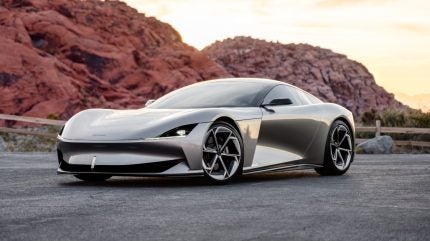
Karma Automotive, a Chinese-owned electric vehicle (EV) manufacturer based in the US (California), is integrating Intel Automotive solutions across its entire vehicle platform.
It says the collaboration with Intel Automotive to co-develop Software Defined Vehicle (SDV) architecture will underpin its upcoming vehicles including the Karma Kaveya (planned for market introduction in 2026).

Discover B2B Marketing That Performs
Combine business intelligence and editorial excellence to reach engaged professionals across 36 leading media platforms.
The companies say they will also demonstrate and validate critical concepts for the advancement of open standards for SDVs that can be ‘shared openly and commercially to support the transformation of the broader automotive industry’.
Marques McCammon, President, Karma Automotive said: “For Tier 1’s and OEMs not quite ready to take the leap from the old way of doing things to the new, Karma Automotive will play as an ally, helping them make that transition with business-to-business SDV solutions in the same way we do today with Karma Connect, our proprietary Vehicle Data Management and Over the Air services platform, which presently provides services to the world’s second largest OEM.”
“As the leader of Intel Automotive, I come by my love of cars honestly, my family having owned everything from a Renault Le Car to a Porsche and an MBG. At Intel Automotive we can see that the industry is facing a perfect storm of unprecedented change. Intel has assisted other industries with such transformations in the past and we’re honoured to do the same in Automotive,” said Jack Weast, Intel Fellow, Vice President, General Manager, Intel Automotive.
Weast added: “Karma sees Intel’s comprehensive vehicle strategy as more than a path to improvement; it represents a paradigm shift. Karma’s commitment to crafting unforgettable experiences – where innovation meets artistry and performance blends with luxury – demonstrates how starting from a clean slate, combined with a visionary approach and the right technology partner, can redefine a software-defined vehicle.”
Karma says SDV Architecture looks at the vehicle systems as a whole, and allows for the seamless movement of workloads between software-defined central “compute” systems and software-defined zonal “compute” sub-systems, ensuring maximum flexibility, optimal cost and performance with significant energy efficiency benefits.
Karma says it will provide Tier 1s and OEMs with business-to-business SDV Architecture solutions. It says Karma Connect, its proprietary Vehicle Data Management and Over the Air services platform, presently ‘provides services to the world’s second largest OEM’.






